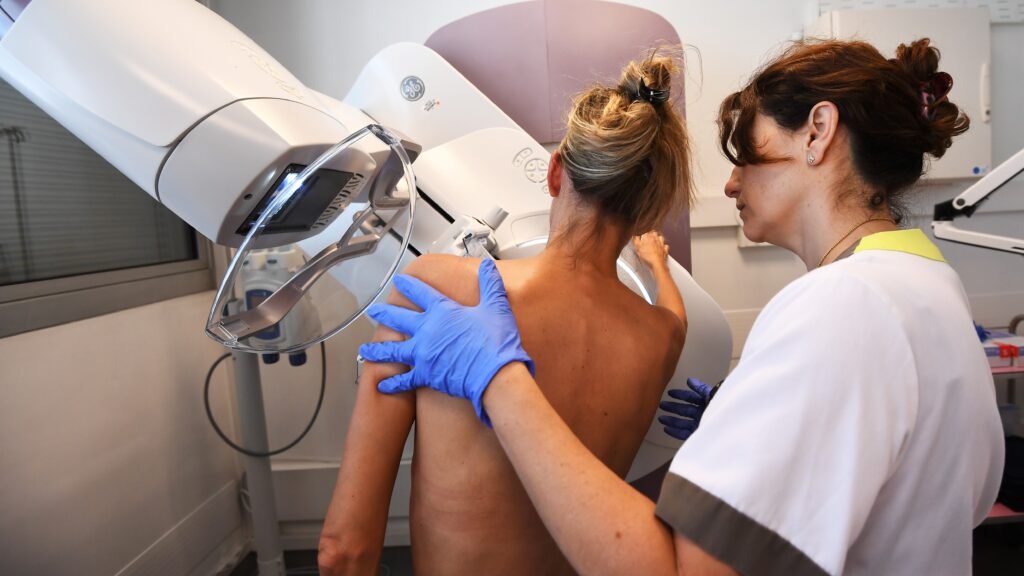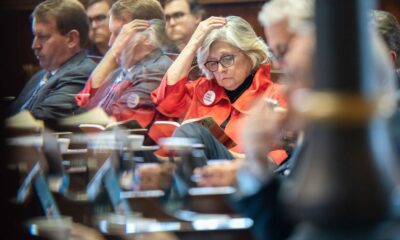Health
Why some women prefer to delay their first mammogram

TThe messages about mammography often go no further than this simple three-word refrain: screening saves lives. Medical groups have also moved toward earlier breast cancer screening: For example, the United States Preventive Services Task Force recommended earlier this year that all women begin screening mammography at age 40.
And yet, more and more women prefer to wait until age 50 before starting screening, after learning the pros and cons of breast cancer screening, according to a study published in the journal The Guardian. Annals of Internal Medicine on Monday. “When women were informed about the pros and cons, more and more women wanted to wait until they were older. Those who wanted to wait until age 50 went from 8.5% to 18%,” said Laura Scherer, a social psychologist at the University of Colorado School of Medicine and lead author of the study.
That may seem strange until you dig deeper into the reasons people gave for their preference. Women who wanted to wait until they were 50 tended to have a lower risk of breast cancer, based on things like family history, and vice versa.
“They had rational, logical reasons for their preferences,” Scherer said. “Women who wanted to screen earlier had higher risks, such as a family history, and were less concerned about the downsides.”
The disadvantages of screening are at the heart of the ongoing debate about the extent to which breast cancer screening is too much screening. Although mammography saves lives, it also carries some risk of false positives, unnecessary biopsies and overdiagnosis. That’s when screening reveals certain early-stage cancers that paradoxically would not have harmed individuals during their lifetime, but treating these cancers comes with some burden.
All cancer screening policies attempt to balance these potential harms with the benefits of early detection or prevention of cancer. In Scherer’s study, approximately 500 women between the ages of 39 and 49 first answered questions about their screening preferences and were then given a decision aidor some relevant information about the pros and cons of breast cancer screening before asking the survey questions again.
Some of that information included statistical modeling results such as “of 1,000 women screened between ages 40 and 49, 239 experience a false positive result… of 1,000 women screened between ages 50 and 59, 220 experience a false positive result.” Similarly, the decision aid also pointed out that starting screening at age 40 would save an additional life in 1,000, although it did not mention other benefits of early detection, such as less intensive treatment. Women were also given a personalized breast cancer risk score, based on that of the National Cancer Institute personal risk calculator.
Notably, Scherer conducted this study before the United States Preventive Services Task Force updated its guidelines to recommend people start screening mammography at age 40.
STAT spoke with Scherer about the study, its results and what they suggest about the way breast cancer screening is communicated. This interview has been edited for length and clarity.
What were the reasons people gave for delaying or not postponing screening after the decision aid?
We asked them to tell us in an open-ended question: What was the main reason for the preference you told us about? Women who wanted to delay were less concerned about cancer risk. On average, they were at lower risk and more concerned about overdiagnosis and false positives. While women who wanted to screen at their current age were at greater risk. On average, they were concerned about a family history of cancer, and they were not as concerned about the downsides.
Other research has shown that some women want to delay screening after receiving evidence about mammography. But one thing was surprising: there was no increase in the number of women who never wanted a mammogram at all. About 5% of women said this was their preference.
I am a social psychologist by training. We think about people’s judgments and prejudices and a lot of research shows that people are not always rational. But this research shows that people have a good understanding of the information, and how it makes sense to them personally, and that they make quite logical judgments as a result.
What do you think about the contrast with the fact that medical societies tend to recommend that people start screening earlier?
I think doctors like to make decisions that make sense from the population’s point of view, and people like to make decisions for themselves that take their personal risks into account. They consider the information with different purposes. There are loud voices calling for more screening, screening at lower ages, but I don’t think this necessarily reflects the perspectives of informed women who are thinking about how the data applies to them personally.
But an important piece of context is that most insurance plans are required to pay for preventive care for which the USPSTF gives an A or B recommendation. The recent change from the former C recommendation to now a B recommendation for screening at age 40 increases access to screening, especially for people with a low income. This is important because the majority of women under the age of 50 indicate that they still want to start screening.
A lot of work is needed to find ways to provide people with personalized screening recommendations. Looking at your findings, does it seem like that’s what people are trying to teach themselves as soon as they learn about breast cancer screening?
We give women information, and they intuitively do what we’re trying to find evidence for: finding personalized screening recommendations. I think this study is promising for the future of personalized screening, and shows that there is a need for it. But we need the data first. We can’t make truly personalized screening recommendations until we know with certainty and some confidence that we will minimize harm and maximize benefit to people. That’s really the goal.
This is being worked on through experiments. The WISDOM study, for example, and its results, could be of great importance.
A key finding was that almost half of the women surveyed found the information surprising or unfamiliar. What do you think of that?
We found that many people said the information contradicted what they had heard before. What they found most surprising is overdiagnosis. Overdiagnosis is difficult to communicate and counterintuitive. What’s even more surprising is the number of women who hadn’t actually heard this information at all. Many women are told to just screen, and they are not exposed to the evidence.
As long as women are informed and make a decision based on that evidence, that’s essentially a good thing. I worry that people are being exposed to information that is not true and being excluded from screening because of false information.
What do you think is missing in the reporting on breast cancer screening?
The USPSTF has written strongly that people have the right to be informed about preventive care. I think that also applies to mammograms. Historically, all we’ve done is send messages about mammograms and say, “go get screened; it saves lives.” That’s definitely true. But it also has disadvantages that concern some people, but not everyone.
There is therefore an ethical need to provide balanced information about mammograms. We know from this research that it will not deter people from screening altogether. My question is: what is the alternative? We don’t inform people about the disadvantages of screening, and one possible consequence is that they may find out in a different way and wonder why they were never told before. I fear that this could promote fundamental mistrust.













